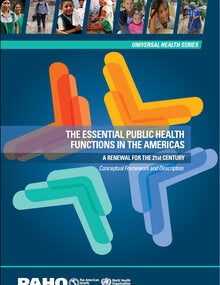The essential public health functions (EPHFs) have constituted the core of the agenda for strengthening the health sector in the Region of the Americas since the 1980s. Their conceptual development and measurement in the Region came in response to sectoral reforms that threatened to reduce the role of the State and public health, particularly the stewardship function of the health authorities. In that context, in 2000, the Member States of the Pan American Health Organization (PAHO) proposed to promote a conceptual and methodological framework for public health and its essential functions, giving rise to the regional initiative called "public health in the Americas".
As part of this initiative, the essential functions of public health authorities were identified, their relevance was discussed, and a broad regional consensus was reached, as explained below. More than 15 years have passed. In response to current needs, this document reviews and updates the EPHF conceptual framework for the Region of the Americas.
This new version is based on the experiences and lessons learned from the implementation and regional measurement of the EPHFs, new and persistent challenges for the health of the population and its social determinants, and new institutional, economic, social, and political conditions which affect the Region of the Americas. The document is structured into five sections. The first presents the key experiences and challenges that justify a renewal of the EPHFs. The second section updates the groundwork for the exercise of public health and provides a framework to inform the exercise of the new essential functions. The third section proposes a new integrated approach for implementing the EPHFs. The fourth section presents a new list of 11 EPHFs related to each stage of this integrated approach. Finally, in the last section, considerations are put forth to guide EPHF implementation as a means of strengthening the health sector.
|

